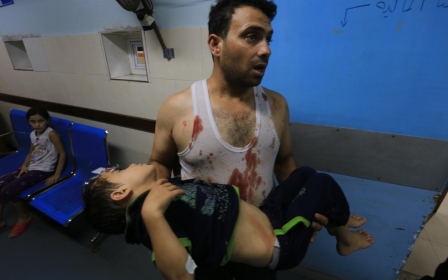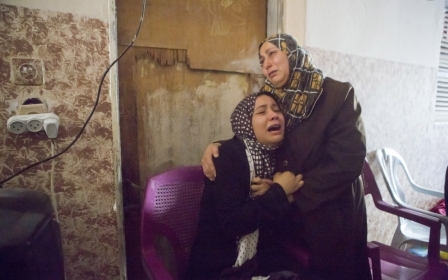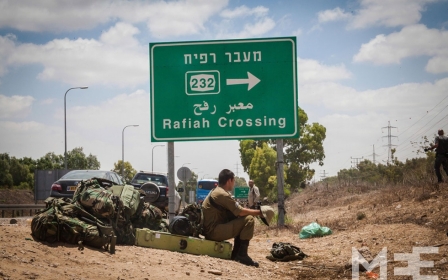Border-zone Israelis dream of peace, end of Hamas
Long-time residents recall 'good times' with Gaza neighbours as rockets rain down

Israeli tanks are now a major part of the ground offensive taking place in Gaza (AA)
Published date: 12 February 2015 17:30 GMT
|
Last update: 9 years 9 months ago
As Boaz Kretschmer braces for more attacks along Israel's border with Gaza, he remembers fondly the times he used to swim in Gaza and shop for fruit and vegetables.
"It was maybe 40 years ago, but [Israel and Gaza] we were neighbours. I used to do my shopping there, and I went to the sea many, many times in Gaza. I bought fish, vegetables, everything. It was a good time.
"The border should be a peace border, now it's a war border."
It's been the first full day since Israeli Prime Minister Benjamin Netanyahu and his cabinet ordered a ground invasion on Gaza, with the target of destroying what he calls the "Hamas terror tunnel".
The ground invasion was ordered just hours after the Israel Defence Force said it thwarted "an infiltration attempt" by 13 Hamas operatives using a tunnel near Kibbutz Sufa in the Eshkol region to enter Israel.
The 63-year-old grandfather of six lives in a kibbutz community to the north of the Eshkol region in the north-west of Israel's Negev desert. The region's western boundary stretches along the border with Gaza for 40 kilometres, and it's worrying times for the 14,000 residents of the area.
For each of the past 11 days, during Israel's Operation Protective Edge, the region has been hit by at least 10 rockets from Gaza, all of them smaller than mortar shells but equally destructive. Mr Kretschmer said that since the present fighting started he hasn't yet seen any drop off in rockets from Gaza.
Dozens of "code red" sirens sound throughout the region during the day, and in neighbouring Ashkelon ity. Nearly 500 rockets have hit the Eshkol region since fighting began.
Mr Kretschmer is a self-proclaimed leftist and usually works in the tourism and economic development office of Eshkol Regional Council. Not today. When Middle East Eye visited the region, Mr Kretschmer had a new assignment.
"In these times of conflict, we stop our day jobs and take care of something else. My job is to deal with the information and to relay it to the public. We give orders to the public by phone to go into the shelters or go to work."
Mr Kretschmer works at the council's headquarters, just four kilometres from the border. He told MEE the tunnels are a real worry, and they're on everyone's minds at the moment.
"It's frightening, Hopefully we will find all of the tunnels; this is one of the threats that makes the population more insecure."
Eshkol's mayor, Haim Jelin, agrees. He said the tunnels are no doubt the main threat. But he doesn't want a full-scale invasion, and he doesn't think many in his community would either.
"There are 1.8 million civilians there [in Gaza], and we need to take precautions, take a limited action. I am calling for the government to take care of it. It's been so tough in Eshkol recently, tougher than usual - sleepless nights and constant worry and stress."
He believes there have been signs from the political division of Hamas that they want to talk, but the military wing seems unwilling. "Hamas insists on constant fighting."
'Most difficult day in 10 years'
Eshkol is a green area dominated by agriculture - peanuts, tomatoes, avocados and potatoes fill the farming region. "Sixty percent of our salads come from here and 80% of Israel's potatoes also," Mr Jelin boasts.
Just down the road from the council, past a fortified secondary school with its own mini "iron dome" of anti-rocket missiles and past the community shelter, which will be used in the coming weeks and months for people to get some sleep, is a kibbutz that has been targeted twice in the past fortnight.
Mr Jelin showed MEE through one of the targets, a small apartment that from the outside appears undamaged but inside is chaos. A gaping hole in the roof and ceiling show where the rocket hit, wood panelling around it is splintered, and there are huge cracks where the walls meet the ceiling. Debris and dust cover the floor.
The 85-year-old woman who lives there had been staying with her family so was not home at the time. Close neighbour 46-year-old Danny Cohen, who has lived in the kibbutz for the past 25 years, said that had it not been for the woman's family evacuating her days earlier, she would have been killed.
"There's a protective room in her apartment, but she would never have got to it in time."
Since the last Israeli military operation in 2012, 80 of the 100 homes in the kibbutz have been hit.
"Yesterday was one of the most difficult days in the last 10 years, hearing about the tunnels." Mr Cohen said. "We're so close to the border, and we also hear when Israel opens fire to the other side. Before the tunnels, the situation was a little more bearable. Always we are afraid that 10 or 12 terrorists will come through the tunnel and attack us."
He thinks the Israeli defence force is doing a good job so far, but believes the directive for a ground offensive should have come sooner.
"Not only is the attack necessary, but it came too late. It's not reasonable that I should live in fear that people will come out of the tunnel next to my house and harm me."
Like Mr Kretschmer, Mr Cohen can recall the time when access to Gaza was freer. He said he used to go there and swim and the Gazans would go to Eshkol and work.
"Everything was quiet and calm. But 15 years ago, before the disengagement [of the Israeli army from Gaza in 2005], the deterioration started, and since the disengagement we have had constant attacks on us, with mortars and alarms and rockets."
On the road to the city of Ashkelon a viewing point, much closer to the border, looks out towards Gaza City to the south. Locals go there to watch as military strikes take place. It's been called "war tourism", but those who have spent hours and hours over the past couple of weeks at the hill top don't mind the label.
Nati lost his uncle to mortar fire in 2012 and now he wants to see Gaza flattened. His friend Shai is quick to point out that it is only Hamas they want gone, not the Palestinian citizens in the strip.
In the port city of Ashkelon itself, about 60 kilometres from Eshkol and Gaza, the streets are quieter and only a handful of people are out enjoying the sunshine and a coffee, among them father and son contractors Ali and Omri. Ali told MEE he feels like a sitting duck.
"We don't feel secure, we feel traumatised; you don't need to be dead or wounded to feel the effects of wounds.
"The streets are empty, the people are all in their homes. My wife is sending me text messages saying she's too afraid to leave, too afraid to get out of the safe room and have a shower," Omri said.
But leaving the city is not an option for either of them. "Israel's my country, I love it, and I was born in Ashkelon."
Surprisingly, Nicky, who runs Eshkol regional council's security department, has had a different experience. He said people are more relaxed now they know what's going on.
"When it's time for emergency, people know what to do, they know how to act, but there was a difference for a while between the government saying 'carry on as normal' and our neighbours fighting us. It threw people off balance.
"The minute they knew this is war, they know what to do. They're relaxed about it."
Reoccupying Gaza not an option
Michael Oren, an historian and a former Israeli ambassador to the United States, commenting on the the possibility of Israel taking Gaza and toppling Hamas: "To whom do we hand the keys to Gaza?"
He doesn't think retaking Gaza is an option.
"It's not viable. It would take a great amount of time and incur a great cost, if not with our own men but certainly in terms of the civilian population.
"It will have a diplomatic cost too. I was involved in the 2005 withdrawal while in the army. It was very traumatic, but there's no groundswell of support for re-occupying Gaza. There has to be another way."
He knows the the longer Israeli soldiers are in Gaza, the more likelihood there is of casualties and the more attention the international media will give to the conflict.
"We need an endgame. We need to be reassured Israel won't come under fire again in 18 months, and that could mean keeping some form of inspection framework in Gaza."
He also wants to see more-moderate Palestinian factions strengthened, and that includes Palestinian Authority President Mahmoud Abbas.
Mr Oren is sitting, talking in a cafe right on the border when about half a dozen loud, deep booms go off.
"They're the 155 millimetre canons. They're firing out, not in."
The car park at the cafe is filled with buses and armoured military vehicles, dozens of soldiers are sitting around, relaxing and joking.
The Israel Defence Force's spokesman for foreign media, Lieutenant Colonel Peter Lerner, is there too. He talks about the previous day's deaths of four children on the beach in Gaza and reassures MEE the incident is being investigated.
Lieutenant Colonel Lerner is at pains to stress the IDF does what it can to avoid civilian casualties. He reveals there have been at least 14 operations in the past fortnight which have had to be aborted.
"We've cancelled missions and literally let terrorists get away because of that calculated potential civilian impact which we are not willing to sustain. We haven't given up on those terrorists though."
He said the army is ready for an expansion of its ground operation, but he doesn't know if or when that would be.
Back in Eshkol, Mr Kretschmer still dreams of fishing in Gaza again, although he admits opportunity will not arrive in his lifetime.
"My grandchildren perhaps will go back fishing in Gaza when there will be peace, I don't believe it will happen in my time, but you know, things change very fast in the Middle East, maybe we will reach that solution."
New MEE newsletter: Jerusalem Dispatch
Sign up to get the latest insights and analysis on Israel-Palestine, alongside Turkey Unpacked and other MEE newsletters
Middle East Eye delivers independent and unrivalled coverage and analysis of the Middle East, North Africa and beyond. To learn more about republishing this content and the associated fees, please fill out this form. More about MEE can be found here.




